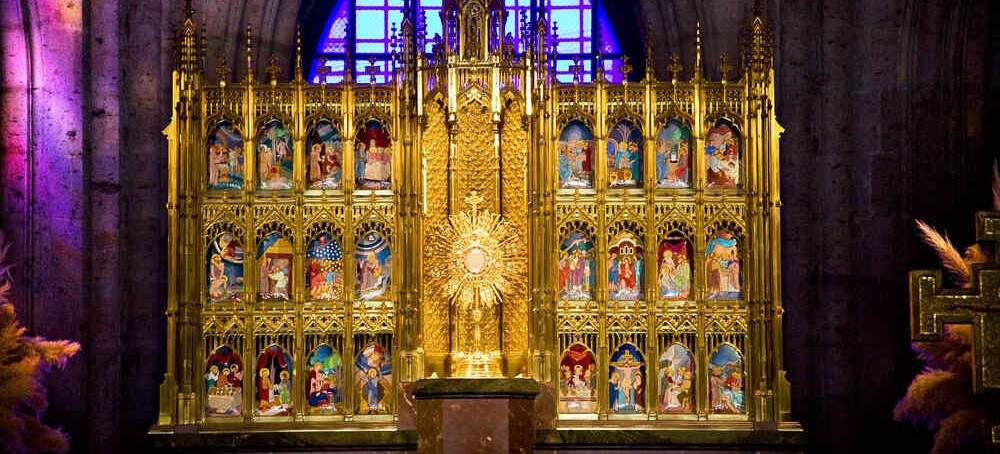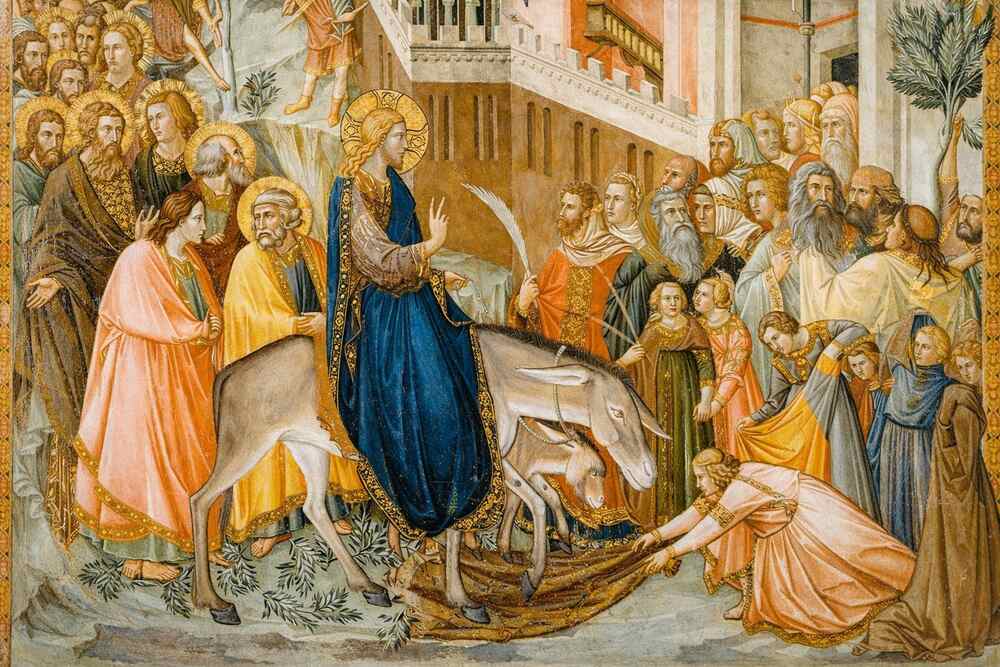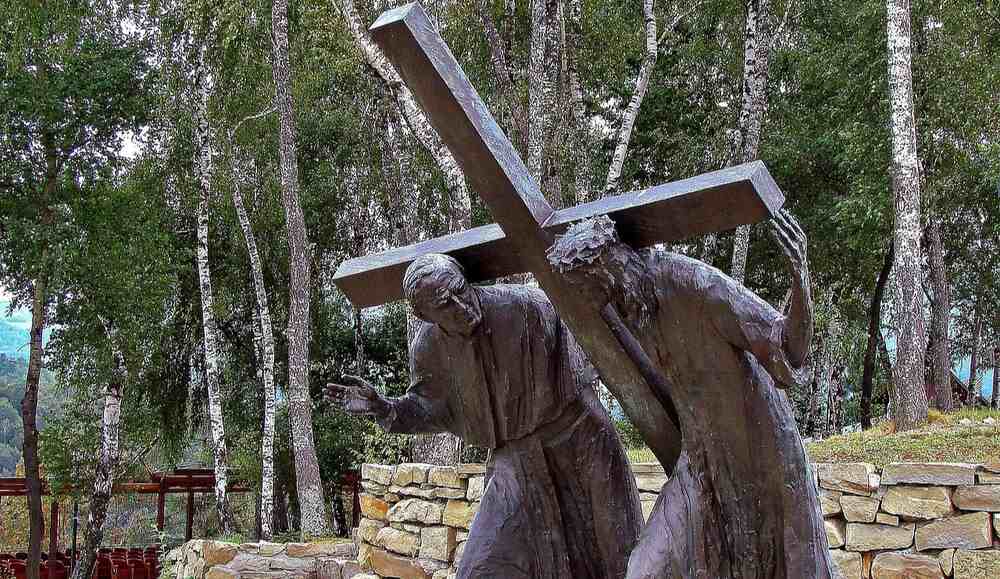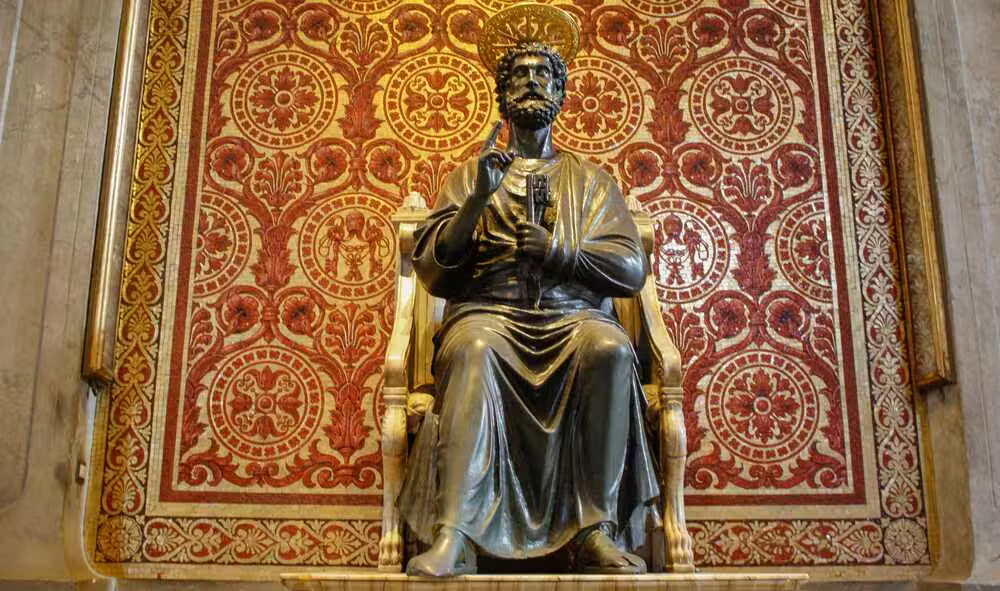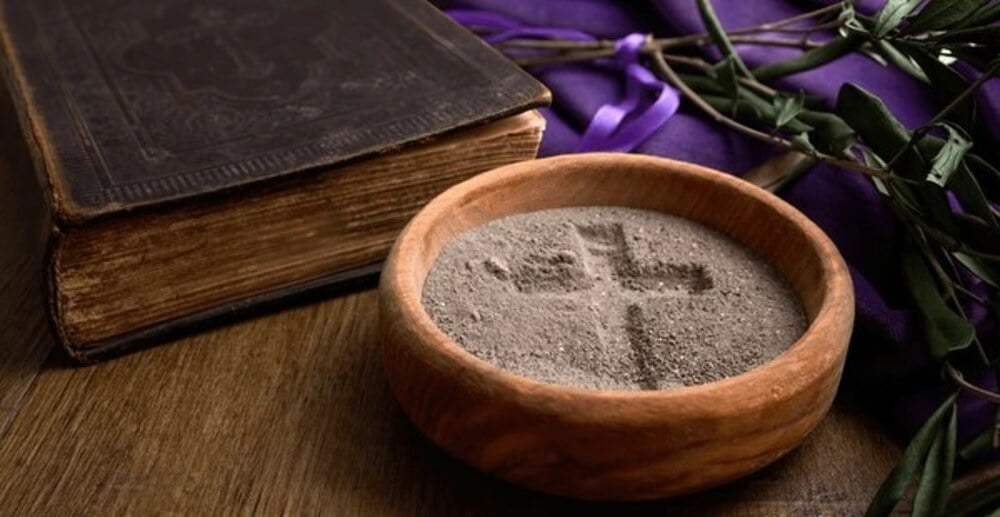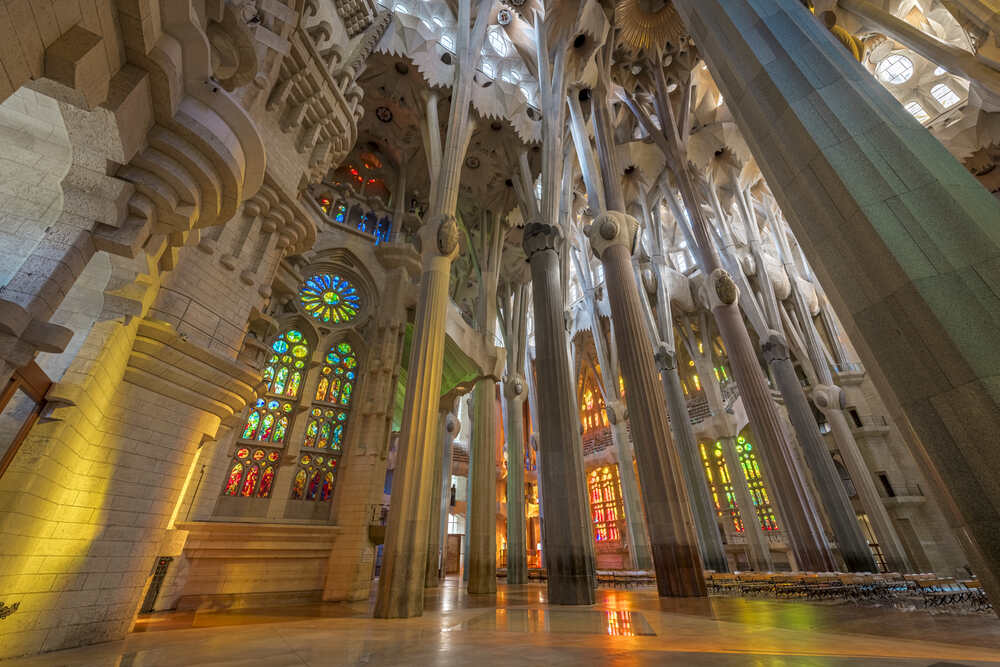Eucharist, Blessed Sacrament, Host, Sacrament of the Altar… Have you ever wondered why the Eucharist has different names?
The names of the Eucharist serve to express and deepen the different aspects of this sacrament. It is not just about calling something different names. Rather, each name reveals a dimension of this mystery and helps us to understand it better.
In this article, we will meditate on 24 names of the Eucharist (there are more) and their meaning.
You can use the Catholic Mass Times app to find the nearest Catholic church with Mass, Confession, and Adoration schedules. It will surely be useful! Download it now.
What Does the Word Eucharist Mean?
The word Eucharist comes from the Greek eucharistein, which means “thanksgiving.” Precisely one of the purposes of Holy Mass is to give thanks to God for all the spiritual and material goods we receive from his generosity. Especially, we thank him for creation, redemption, and the daily providence that sustains our lives. Likewise, we must give thanks to the Lord for his Eucharistic presence.
Saint Peter Julian Eymard, the apostle of Eucharistic Adoration, wrote:
To better give thanks, admire Jesus in the Blessed Sacrament. Admire the sacrifices He makes present in the Eucharist: He hides His glory and majesty so that you can approach and speak to Him as a friend. How good He is! He is available at all hours for you to visit Him. And as soon as you enter the church, He receives you with great joy.
What are the Best-Known Names of the Eucharist?
Blessed Sacrament
Of all the names of the Eucharist, it is the best known. As Christ is truly, really, and substantially present in the Eucharist with his Body, Blood, Soul, and Divinity, it is the most important and holiest Sacrament of all.
This name designates the Eucharistic species kept in the tabernacle.
Communion
This name of the Eucharist reminds us of the wonderful effect it produces in our souls: the intimate union with Christ himself who comes to dwell in it. Furthermore, according to the Catechism:
The Lord makes us partakers of his Body and of his Blood to form a single Body, which is the Church
Immaculate Host
The word Host comes from the Latin hostia, which means “victim.” This title refers to Christ as the perfect victim offered to God the Father in the sacrifice of the cross, which is made present in the Eucharist. This name especially highlights the sacrificial aspect of the sacrament, remembering that each Mass is the actualization of Christ’s sacrifice on the altar for our redemption.
Other names with a similar meaning to this are:
-
Memorial of the Passion and Resurrection: Emphasizes that the Mass is not just a memory, but makes present the sacrifice of Christ, his Passion, Death, and Resurrection. By participating in the Eucharist, the faithful unite themselves to this saving event as if they were there.
-
Holy Sacrifice of the Altar: Highlights that each Eucharistic celebration is the same sacrifice of Christ offered on the cross, now made present on the altar in an unbloody manner (without bloodshed). The Church and the faithful unite themselves to this sacrifice in prayer and adoration.
-
Sacrifice of praise: Highlights the aspect of thanksgiving and adoration. The Eucharist not only offers Christ as a victim, but also praises and glorifies God, showing gratitude for salvation and the gifts received.
-
Spiritual Sacrifice: The Eucharist unites us to Christ and transforms our own lives into a spiritual offering pleasing to God.
-
Pure and holy Sacrifice: Indicates that this sacrifice completes and surpasses all the sacrifices of the Old Covenant, being perfect and pleasing to God. It reflects the holiness and purity of Christ who offers himself for all.
Banquet of the Lord
This name is found in the letters of Saint Paul. It is so called because it recalls the Last Supper that Jesus celebrated with his disciples before his passion. At the same time, it anticipates the eternal banquet in the Heavenly Jerusalem:
Then the Angel said to me, “Write this: Blessed are those who have been invited to the wedding banquet of the Lamb.” (Rev 19:9).
Breaking of the Bread
This rite, proper to the Jewish banquet, was used by Jesus when he blessed and distributed the bread as head of the family, especially at the Last Supper.
In this gesture the disciples will recognize him after his resurrection:
And being at the table, he took bread, gave thanks, broke it and gave it to them. Then their eyes were opened and they recognized him, and he disappeared from their sight. (Lk 24:30-31).
With this expression the first Christians designated their Eucharistic assemblies.
Holy and Divine Liturgy
This denomination, used mainly in the East. P because the entire liturgy of the Church finds its center and its densest expression in the celebration of this sacrament. In the same sense it is also called celebration of the holy mysteries.
- You may be interested in: What is the Mass and what Miracles occur in it?
Viaticum
Term used for the reception of Holy Communion by a sick person on their deathbed. Viaticum is the Holy Eucharist received by those who are about to leave this earthly life and are preparing for the journey to eternal life.
Medicine of Immortality
Antidote against death and food that makes us live forever in Jesus Christ. By feeding ourselves with this medicine we can strengthen ourselves to face our trials and, God willing, pass through a happy death to the glory of eternal life.
Other Names of the Eucharist
Bread
The Eucharist is also called “bread of angels”, “bread of Heaven”, “true bread” and “living bread.”
These names highlight its divine origin and its spiritual power:
-
Bread of angels: refers to the fact that it is such a sublime food that even the angels contemplate and celebrate it in the vision of the celestial liturgy.
-
Bread of Heaven: emphasizes that it comes directly from God and is not a common food, but a heavenly gift that sustains spiritual life.
-
True bread: indicates that it is the real and genuine food that fulfills in this earthly life and gives eternal life, in contrast to any other temporal food.
-
Living bread: because it gives life to those who receive it, not only in the body, but especially in the soul, strengthening the union with Christ.
Together, these names emphasize that the Eucharist is not a simple bread, but a divine food that communicates the life of God to the faithful.
Strength and Food for the Journey
In 1 Kings 19:7-8 we see a preannouncement of this:
The angel of the Lord came a second time, touched him and said, ‘Get up, eat, for the journey is too long for you.’ He got up, ate and drank, and with the strength of that food he walked forty days and forty nights to the mountain of God, Horeb.
Love
The Blessed Sacrament is the great proof of divine love. Therefore, the names of the Eucharist linked to this reality are:
-
Sacrament of love: It is called this because it is the supreme sign of Christ’s love, who gives himself for us in the sacrifice of the cross and in every Mass.
-
Sign of unity: It highlights that the Eucharist unites all the faithful in one body, the Church, strengthening the communion between Christians.
-
Bond of charity: It shows that receiving the Eucharist strengthens the bonds of Christian love, inspiring the faithful to live in charity and service.
-
Divine Cyrenian of humanity: Just as Simon of Cyrene helped Jesus carry the cross, Christ in the Eucharist bears our sins and sufferings to make them more bearable. In addition, he offers us comfort and strength.
- Love and gift: The Eucharist is the greatest of all the gifts that love has inspired in Christ.
- You may be interested in: 4 Proofs of the Real Presence of Christ in the Eucharist
A Sunday Practice
Meditating on the names of the Eucharist should awaken awe, love, and gratitude in our hearts. Each of these names attempts to explain an aspect of a sublime and boundless mystery.
How good it would be if we could stop and savor at least one name each Sunday before attending Holy Mass! This practice would greatly help us to better prepare for the Eucharistic celebration and to be more aware that Jesus makes himself present in the Blessed Sacrament out of love for us and to take us to Heaven.
Let us ask him, after receiving him in the secret of our soul, for this grace that Saint Thomas Aquinas asked for:
O Good Shepherd, true Bread,
O Jesus, our Lord, have mercy on us!
Feed us and watch over us;
and make us contemplate the true blessings
in the land of the living.
You who know all things, and can do all things,
You who feed us mortals,
make us your guests,
heirs and companions
with the Saints of heaven!.
Amen, hallelujah.
What is the Eucharist?
What other Names Does the Eucharist Receive?
The Eucharist receives numerous names that highlight different aspects of this sacrament. Among them are: Blessed Sacrament, Host, Sacrament of the Altar, Bread of Angels, Bread of Heaven, True Bread, Living Bread, Viaticum, Medicine of Immortality, Sacrament of Love, Sign of Unity, Bond of Charity and Divine Cyrenian of Humanity, among others. Each name expresses a particular dimension: its sacrificial value, its spiritual power, its ability to unite the faithful, and its character as divine food.
What are the Names of the Holy Mass?
The Holy Mass shares many of the names of the Eucharist, especially those that highlight its sacrificial and community dimension. It is called Holy Sacrifice of the Altar, Memorial of the Passion and Resurrection of the Lord, Sacrifice of Praise, Spiritual Sacrifice, Pure and Holy Sacrifice, Holy and Divine Liturgy, Celebration of the Holy Mysteries, and, more colloquially, Holy Mass. These names reflect that in the Mass the sacrifice of Christ on the Cross is updated in an unbloody manner.
Is Communion the Same as Eucharist?
Communion is the moment of the Holy Mass in which the faithful receive the Eucharist.
Why is it Important to Meditate on the Names of the Eucharist?
Meditating on the names allows us to deepen in the spiritual richness of the Eucharist, recognizing its different aspects: sacrifice, communion, love, and unity, and thus live each celebration with greater faith and devotion.

